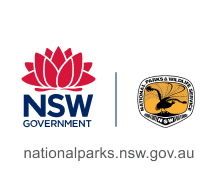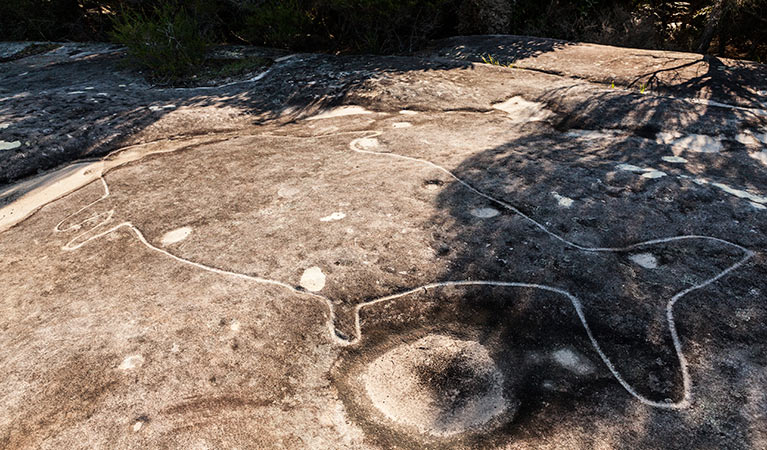Overview
This excursion is currently being revised to be delivered in line with NSW Education’s Aboriginal and Torres Strait Islander Principles and Protocols. We will be updating this excursion's name and information online soon.
Read more about Past in the present at Jibbon Beach
Through fun activities such as ochre painting, bracelet weaving and storytelling through dance, students will learn about local Aboriginal culture. We'll discover how the Dharawal People lived sustainably on the land, using plants for food, shelter, tools and medicine.
With their guide sharing knowledge of Country, students will develop a rich appreciation of Aboriginal life before white settlement.
For program outline, safety and practical information about this excursion, see info for teachers
| Stage | Stage 1 (Years 1-2) |
|---|---|
| Learning area | History |
| Student outcomes |
HT1-2. Identifies and describes significant people, events, places and sites in the local community over time HT1-3. Describes the effects of changing technology on people's lives over time HT1-4. Demonstrates skills of historical inquiry and communication |
| Objectives |
Students will:
|
Excursion details
- When
Weekdays during school term.
- Duration
- 4hrs
- Grading
- Medium. Guided activities in a park on grass, along a beach, through a bush track and along a headland.
- Price
-
$17 per student for groups of 25 or more. GST included. For smaller groups conditions apply.
- Accessibility
- No wheelchair access
- Meeting point
- Bonnie Vale picnic area carpark (enter via Sea Breeze Lane)
- Equipment
provided - Yes. All equipment provided.
- Booking
- Contact your local NSW National Parks office for more information about the updated excursion.
Local alerts
For the latest updates on fires, closures and other alerts in this area, see https://www.nationalparks.nsw.gov.au/education/stage-1-history-past-present-jibbon-beach/local-alerts
Operated by
- School excursion inquiries - Sydney South
- 02 9542 0615
- npws.royalguidedtours@environment.nsw.gov.au
- PO Box 144, Audley NSW 2232
Park info
- in Royal National Park in the Sydney and surrounds and South Coast regions
Royal National Park is open 7am to 8.30pm but may have to close at times due to poor weather or fire danger.
-
Park entry fees:
$12 per vehicle per day. Payment options include Audley Visitor Centre, vehicle entry stations, pay machines and the Park’nPay app.
Vehicles over 8 seats: $4.40 per adult, $2.20 per child (per day). Teachers/educational supervisors: free (1 adult per 10 students).
Buy annual pass.
Info for teachers
All the practical information you need to know about Past in the present at Jibbon Beach.
Program outline
- Welcome and introductions, acknowledgment and safety talk
- Demonstration of preserved animals and Aboriginal artefacts
- Morning tea and toilet break
- Cultural interpretation walk along Jibbon Beach
- Storytelling and ochre face painting
- Visit Jibbon Beach rock engravings
- Shelly Beach loop walk (optional)
- Lunch
Getting there and parking
Get driving directions
Bonnie Vale picnic area is in the Bundeena area of Royal National Park.
To drive there from Audley:
- Drive across Audley Weir and continue along Sir Bertram Stevens Drive for approximately 10km
- Turn left onto Bundeena Drive and continue to Bundeena township
- As you enter the town, turn left onto Sea Breeze Lane and follow the signs to the carpark.
What to bring
Please wear fully enclosed shoes and bring a hat, sunscreen, wet weather gear, and lunch which should be low waste with a refillable water bottle. Students should bring gear in a backpack or similar (not plastic bags). Drinking water is not available.
Maps and downloads
Risk assessment and risk benefits
Our rangers and guides have the technical skill and experience to assess the risks and the benefits of a variety of activities delivered as part of our learning programs.
We believe in including opportunities that allow students to learn and experience for themselves through exploration in the natural environment.
Please make your own risk assessment based on the information provided. Detailed potential risks and controls are provided for the site to assist teachers in risk management planning. Teachers and carers should be aware of, and consider the needs, abilities and medical conditions of students when visiting this site. The supervision of students remains the responsibility of the teacher. The school must ensure an adequate number of adult supervisors are present.
Accessibility
Disability access level - no wheelchair access
This site is not wheelchair accessible. If you have someone with special needs, please let us know in advance so that we can plan accordingly.

